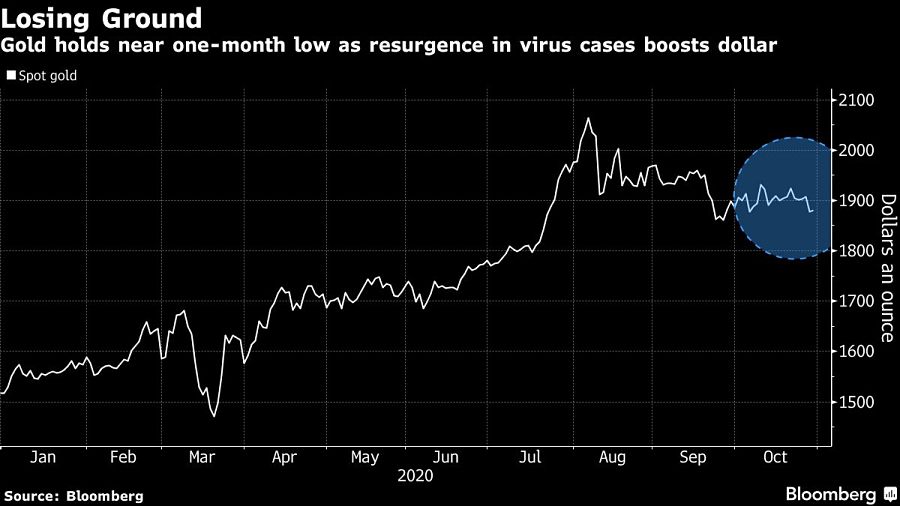

Gold and silver fell to one-month lows as the coronavirus spike in Europe continued to boost haven demand for the dollar, while investors weighed signs the European Central Bank will increase stimulus this year.
The Bloomberg Dollar Spot Index reached a two-week high. German Chancellor Angela Merkel said the country is in a “dramatic situation” amid strains on health care services. With record numbers of new COVID-19 cases in Spain, Italy and the U.K., tough new restrictions in Europe are now threatening to pitch the region back into recession.
“The downbeat atmosphere in the European markets is keeping gold under some pressure,” with the spot price breaching $1,880 an ounce, StoneX analyst Rhona O’Connell said in a note.
Exchange-traded funds backed by gold posted the biggest outflow in more than a month, according to an initial tally by Bloomberg.

Gold dropped 0.2% to $1,874.05 at 10:30 a.m. New York time after touching $1,860.04, the lowest level since Sept. 28. The price headed for the third straight monthly decline, the longest slump since April 2019.
Silver fell 0.6% to $23.23 an ounce after touching $22.59, a four-week low. Platinum and palladium dropped.
“We think there will be ongoing downward pressure on gold prices in the near term as the dollar finds support from global growth concerns,” said Vivek Dhar, an analyst at Commonwealth Bank of Australia. “There is a high risk of a double-dip recession in the eurozone because governments are reinstating broad-based lockdown measures.”

A new proposal could end the ban on promoting client reviews in states like California and Connecticut, giving state-registered advisors a level playing field with their SEC-registered peers.

Morningstar research data show improved retirement trajectories for self-directors and allocators placed in managed accounts.

Some in the industry say that more UBS financial advisors this year will be heading for the exits.

The Wall Street giant has blasted data middlemen as digital freeloaders, but tech firms and consumer advocates are pushing back.

Research reveals a 4% year-on-year increase in expenses that one in five Americans, including one-quarter of Gen Xers, say they have not planned for.
Orion's Tom Wilson on delivering coordinated, high-touch service in a world where returns alone no longer set you apart.
Barely a decade old, registered index-linked annuities have quickly surged in popularity, thanks to their unique blend of protection and growth potential—an appealing option for investors looking to chart a steadier course through today's choppy market waters, says Myles Lambert, Brighthouse Financial.
